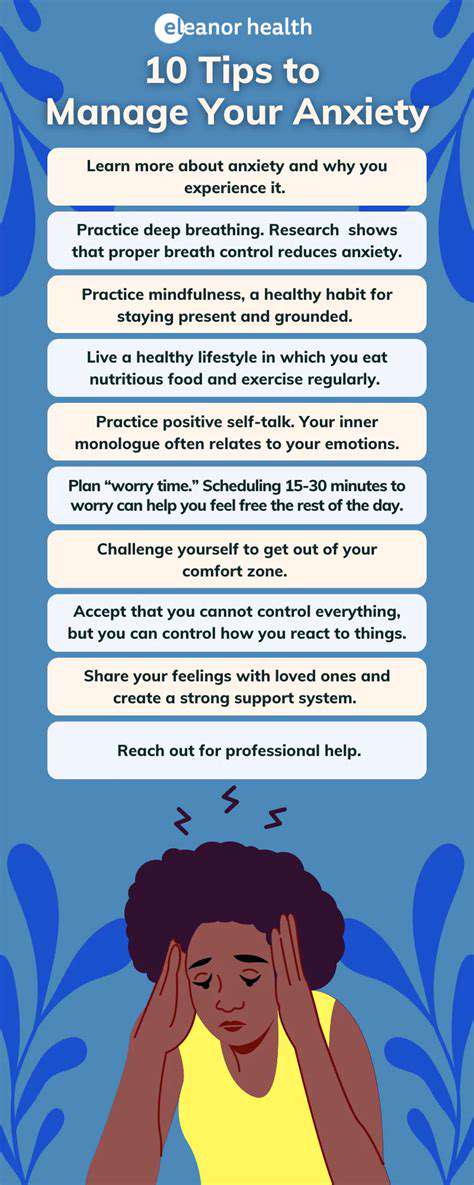Why Anxiety Might Be Worse in the Morning and How to Cope
Common Lifestyle Factors
Many individuals experience morning anxiety as a result of interwoven lifestyle factors, often overlooked in the rush of the day. A poor night's sleep, characterized by frequent awakenings, interrupted sleep cycles, or simply not getting enough hours of quality rest, can significantly contribute to feelings of anxiety upon waking. The stress and tension accumulated throughout the day, even if seemingly insignificant, can carry over into the next, manifesting as an unwelcome anxiety in the morning. Poor diet, lacking in essential nutrients, can also contribute, as can a lack of regular exercise, which can lead to elevated cortisol levels, the hormone associated with stress response. This constant state of stress can make you more susceptible to experiencing morning anxiety.
Furthermore, a hectic morning routine often exacerbates the issue. The pressure to accomplish tasks, juggle responsibilities, and navigate the often chaotic start of the day can trigger a cascade of anxious thoughts and feelings. For some, this anxiety is further compounded by unresolved issues from the previous day, lingering in the subconscious and manifesting in the form of mounting worry upon waking.
Underlying Psychological Issues
While lifestyle factors often play a role, morning anxiety can also be a symptom of deeper psychological issues. Anxiety disorders, such as generalized anxiety disorder (GAD) or panic disorder, can manifest with increased anxiety levels in the mornings. These disorders, often rooted in underlying fear or worry about the future, can lead to a constant state of hyper-vigilance, triggering feelings of dread and unease first thing in the morning. Individuals struggling with post-traumatic stress disorder (PTSD) may also experience morning anxiety as a result of re-experiencing traumatic memories or flashbacks. Experiencing these disturbing or upsetting memories as soon as the day begins can trigger profound anxiety.
Additionally, pre-existing conditions like depression can also contribute. The low moods and feelings of hopelessness associated with depression can often worsen first thing in the morning, leading to a sense of overwhelming anxiety as the day unfolds. The combination of these underlying psychological issues can create a cycle of persistent morning anxiety, impacting daily life.
Physical Health Considerations
It's crucial to consider physical health conditions as potential triggers for morning anxiety. Chronic pain conditions, such as fibromyalgia or arthritis, can cause significant discomfort and disrupt sleep patterns, leading to increased anxiety in the morning. These chronic pains contribute to a negative feeling of being overwhelmed and can intensify as the day begins.
Medical conditions like hypothyroidism or other hormonal imbalances can also contribute to morning anxiety. The fluctuating levels of hormones can disrupt sleep and mood regulation, exacerbating pre-existing anxiety tendencies. A thorough evaluation with a medical professional can help pinpoint any underlying physical conditions that might be contributing to the experience of morning anxiety.
Lifestyle Factors and Morning Anxiety

Dietary Habits and Morning Anxiety
A healthy diet plays a crucial role in managing overall well-being, including the prevention and mitigation of morning anxiety. Consuming a balanced breakfast rich in complex carbohydrates, lean protein, and healthy fats can provide sustained energy, stabilizing blood sugar levels, and promoting a more stable mood. Avoiding sugary foods and excessive caffeine, which can lead to energy crashes and heightened anxiety, is also essential.
Regular consumption of processed foods, excessive sugar, and refined carbohydrates can contribute to fluctuating blood sugar levels. These fluctuations can trigger anxiety, particularly in the morning when energy levels are already low after a night's rest.
Sleep Hygiene and Morning Anxiety
Adequate and quality sleep is fundamental to emotional regulation and the prevention of morning anxiety. Establishing a consistent sleep schedule, creating a relaxing bedtime routine, and ensuring a dark, quiet, and cool sleep environment can significantly improve sleep quality. Sufficient sleep allows the body and mind to properly recover, reducing the likelihood of experiencing anxiety upon waking.
Prioritizing 7-9 hours of sleep each night can improve cognitive function and emotional regulation, leading to a calmer and more positive morning experience. Stress and anxiety can significantly disrupt sleep patterns, leading to a vicious cycle. Addressing underlying stress factors is often crucial for achieving better sleep hygiene.
Physical Activity and Morning Anxiety
Engaging in regular physical activity, especially in the morning, can have a significant positive impact on mood and anxiety levels. A brisk walk, light exercise, or yoga can help release endorphins, which have mood-boosting effects and can reduce feelings of anxiety. Regular physical activity can also help regulate the body's natural rhythms and promote a sense of calm.
Incorporating morning movement into one's routine can act as a preventative measure against morning anxiety. Exercise can reduce stress hormones, making it easier to wake up feeling calmer and more centered.
Hydration and Morning Anxiety
Staying properly hydrated is essential for overall well-being, and it can significantly influence emotional regulation. Dehydration can often manifest as irritability, difficulty concentrating, and a heightened sense of anxiety. Ensuring adequate water intake throughout the day, especially in the morning, can significantly reduce the likelihood of experiencing morning anxiety.
Drinking water first thing in the morning can help kickstart the body's natural functions and provide a sense of clarity and rejuvenation. This, in turn, contributes to a calmer and more positive morning experience. A glass of water upon waking can be a simple yet effective way to combat morning anxiety.
Stress Management Techniques for Morning Anxiety
Implementing stress-reducing techniques, such as meditation, deep breathing exercises, or mindfulness practices, can be instrumental in managing and reducing morning anxiety. Mindfulness practices can help individuals become more aware of their thoughts and emotions without judgment, promoting a more peaceful state of mind.
Practicing these techniques consistently can cultivate emotional resilience and develop coping mechanisms for managing stressful situations, both large and small.
Morning Routine and Mindfulness
Developing a calming and mindful morning routine can significantly impact the overall experience of waking up. Incorporating activities such as gentle stretching, light yoga, or spending time in nature can help create a sense of peace and tranquility. A mindful morning routine allows for a mindful start to the day.
Prioritizing self-care and cultivating a positive mindset in the morning sets a tone for the rest of the day, significantly reducing the likelihood of experiencing morning anxiety. A well-structured and thoughtful morning routine acts as a buffer against the stresses of the day.
Exposure to Natural Light and Morning Anxiety
Exposure to natural sunlight in the morning can regulate the body's natural circadian rhythm, significantly impacting mood and anxiety levels. Opening the curtains, stepping outside for a few minutes, or even sitting near a sunny window can have a profound effect.
Light exposure signals the body's internal clock to wake up and function optimally, thus reducing the feeling of grogginess and anxiety associated with a lack of sunlight exposure. This natural light exposure promotes a more positive and productive morning experience.
Practical Strategies to Manage Morning Anxiety

Prioritizing Tasks and Setting Realistic Goals
Effective management of morale hinges on a clear understanding of priorities. Prioritizing tasks that directly contribute to team objectives helps maintain focus and reduce stress, which in turn improves morale. This includes setting realistic deadlines and acknowledging potential roadblocks. Establishing attainable goals and breaking down larger projects into smaller, manageable steps provides a sense of accomplishment and motivates individuals to contribute effectively. Recognizing and celebrating milestones, no matter how small, fosters a positive and encouraging atmosphere, further boosting team morale.
Open Communication and Active Listening
Transparent communication is crucial for building trust and fostering a positive work environment. Openly sharing information, updates, and concerns promotes a sense of belonging and shared responsibility. Actively listening to team members' ideas, concerns, and feedback shows respect and value, which is essential for maintaining high morale. Encouraging open dialogue through regular team meetings or one-on-one discussions creates a platform for addressing issues promptly and preventing them from escalating into larger problems.
Recognizing and Rewarding Contributions
Acknowledging and appreciating the efforts of team members is a powerful morale booster. Simple gestures of appreciation, such as verbal praise or a small token of recognition, can significantly impact employee morale. Formal rewards programs can further enhance the sense of value and accomplishment. Recognizing not only high-performing individuals but also those who consistently contribute to the team's success fosters a collaborative and supportive atmosphere where everyone feels valued and appreciated.
Creating a Supportive and Inclusive Environment
A supportive and inclusive work environment is paramount to maintaining high morale. This involves creating a culture where diversity is celebrated and every team member feels respected and valued. Promoting inclusivity through diverse representation in leadership roles and creating a space for open communication and feedback mechanisms strengthens the feeling of belonging and empowerment among team members. A supportive environment allows individuals to take calculated risks and openly share ideas without fear of judgment.
Addressing Issues Proactively and Constructively
Addressing issues and concerns promptly and constructively is essential for maintaining a positive work environment and boosting morale. Ignoring problems can lead to resentment and decreased productivity. Implementing strategies for conflict resolution and providing support for employees facing challenges ensures that everyone feels heard and understood. Prompt and constructive intervention can prevent minor issues from escalating into major conflicts. Addressing problems proactively demonstrates leadership commitment to employee well-being and fosters a culture of trust and mutual respect.